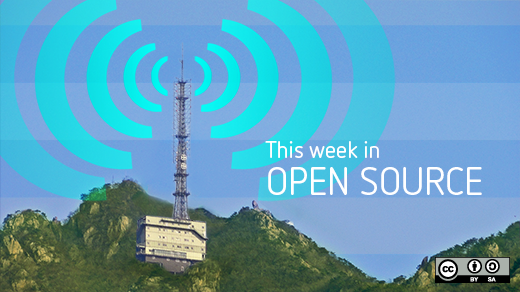In this week's edition of our open source news roundup, we take a look at OnePlus adopting a new mobile OS, robots powered by the Raspberry Pi 2, a big data vendor going open source, and more!
Open source news for your reading pleasure.
February 15 to February 20, 2015
OnePlus to ditch CyanogenMod for OxygenOS
OnePlus, maker of the OnePlus One handset, is ditching the popular CyanogenMod smartphone ROM in favor of its own homegrown ROM called OxygenOS. The split comes on the heels of CyanogenMod's developer signing an exclusive deal with a handset maker in India, a market OnePlus hoped to enter.
The ROM, based on Android Lollipop, won't be open source—it will pack proprietary drivers. Carl Pei, co-founder of OnePlus, said "By creating our own software, we're better able to work directly with our users to improve our OS." Pei added that "we're keeping it clean and streamlined for performance. We value things like battery life and system efficiency."
OnePlus was one of the first handset makers to ship phones with CyanogenMod as their stock ROM. However, it's unclear whether dropping the open source ROM will hinder or help OnePlus.
Robots, with more Raspberry Pi
It's only been out for a couple of weeks, but the Raspberry Pi 2 board computer is already starting to show up in some interesting places. Robotics company CoroWare launched an Indiegogo campaign to fund the CoroBot Spark, an "open robot platform for STEM education."
Along with the Raspberry Pi 2 board, the CoroBot Spark kit packs a chassis, wheels, motors, sensors, a battery, and a camera. The software stack is written in Python, and includes various open source development tools and an open API. CoroWare claims you'll be able to assemble the Spark in half an hour using only a screwdriver.
The CoroBot Spark is aimed at middle and high school students, but it can be used in university research as well. According to the CoroBot Indiegogo page, "The purpose of this project is to build a community. We believe that students of today need the skills to obtain the engineering jobs of tomorrow. Learning to program and build are the most powerful skills anyone can learn."
Keeping underfunded open source projects alive
Chances are, you read recent news stories about the financial woes of Werner Koch, the primary developer of some widely used open source encryption tools. Luckily for Koch, and those of us who value our privacy, his story ended well. He received enough funding to keep working on GNU Privacy Guard (GPG).
An article at Slate.com points out, not every open source project can expect a happy ending like Koch's. David Auerbach points out that "Koch has been free to program according to his ideals, yet the lack of resources has stretched the GPG project thin over the years." He goes on to say that "there exists a real and ongoing tension between corporations and FOSS exponents."
Without financial backing (from corporations or elsewhere), important and underfunded projects could flounder. Worse, problems and bugs may not be found before they cause problems. But "the question becomes how to advance (FOSS), so that we hear less about the tech world’s Peter Thiels and more about its Werner Kochs."
Pivotal plans to open source most of its big data tools
IT system and service provider Pivotal has announced it will open source a majority of its big data tools. Pivotal will be releasing the code for the HAWQ parallel procesing tool, the GreenPlum data warehouse, and the GemFire NOSQL database. According to Pivotal's CTO Sundeep Madra, the tools will be "based on an open source core."
Madra says going open source "makes sure Pivotal is aboard the open source train before its momentum moves the market away from the company’s current offerings." Many of those offering are based on open source data frameworks like Apache Hadoop.
Pivotal has joined a number of other tech companies in the Open Data Platform (ODP) group. Madra said that the ODP intends to create "a tested reference core of Apache Hadoop, Apache Ambari and related Apache source artifacts."
University of Illinois bans posting homework on GitHub, then reverses course
What happens when you're a university student and you post the answers to your homework on GitHub? Your school issues a DMCA takedown notice.
That's exactly the situation a University of Illinois computer science student found themselves in recently, according to this article in Wired. After protests from students, the university withdrew the notice. But it shows that "the world’s developers are moving towards a model of open collaboration. And though that works well for them, it clashes with the way the world of programming traditionally operated."
This incident also highlights the differences in perception of what's collaboration and what's cheating. Andrew Dunn, a graduate student at Northwestern University, told Wired that "The whole concept of using a DMCA takedown on the student who is openly working is broken." On the other hand, University of Tennessee, Knoxville computer science professor Mike Berry stated "They’re stuck with a damned-if-you-do, damned-if-you-don’t situation. They don’t want to suppress, but at the same time its an academic integrity issue."
Professor Rob Rutenbar, head of the university's computer science project, said that it’s "important to strike a balance between teaching open collaboration, and teaching kids how to code." To ensure that students understand the material, and are not just copying, professors at the University of Illinois plan to test them using computers without internet connections.
In other news
- How open source delivers for governments
- Portugal's government to expand its adoption of open source
- Want to hire open source talent? Then focus on the community
- Hands on with the new Ubuntu smartphone
- Will open source firmware gain a foothold in the hard drive market?
A big thanks, as always, to the Opensource.com moderators and staff for their help this week.







1 Comment